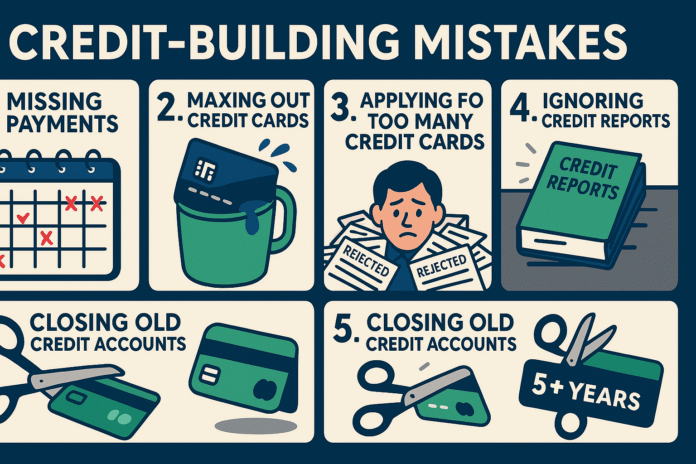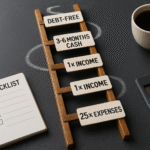Building credit is something you have to do for the rest of your life. You need to know what to do and what not to do. If you’re new to credit, trying to fix bad credit, or just trying to understand how credit works, it’s very important to avoid common mistakes. We’ll talk about credit-building mistakes that can slow down your progress, explain why they matter, and give you useful tips on how to avoid making them in this post. By knowing what these mistakes are, you’ll be better able to make smart financial choices and use credit repair tips that will help you succeed while fixing your credit the right way.
Beginning
Building credit is more than just getting a good score; it’s also about building a financial reputation that affects how lenders, landlords, and even employers see you. The way you handle your credit today will affect the financial options you have in the future. The way you handle your credit can have effects right away and for a long time. For example, it can help you get a good mortgage rate or a job that requires a credit check.
A lot of beginners quickly focus on what to do, like making payments on time, keeping their credit utilization low, and using a mix of credit types. But a lot of people don’t realize that knowing what not to do is just as important. If you’re not careful, even good intentions can sometimes backfire. For example, closing that old credit card account might seem like a good way to lower your debt, but it can actually lower your total available credit and hurt your score.
In this blog post, we’re going to talk about the mistakes that a lot of people make on the road to financial health. We’ll talk about five big mistakes, give real-life examples, explain how they affect your credit score, and give you useful tips on how to avoid them. Knowing about these common traps will not only help you avoid problems, but it will also give you the power to shape your own financial story.
Knowing about these mistakes will help you build your credit more effectively. Our goal is to help you avoid expensive mistakes so you can build credit safely and confidently. We do this by being understanding, clear, and easy to talk to. Let’s look at what might be holding you back and learn how to build credit the right way.
1. Closing Old Credit Accounts Too Early
What the mistake is and why it happens
Closing old credit accounts too soon is one of the most common mistakes people make when trying to build credit. If you don’t use a credit card anymore, it makes sense to close it, especially if it has an annual fee or if you’re trying to make your finances easier. But closing an old account can actually shorten your credit history and lower the amount of credit you have available, both of which are very important for your credit score.
A lot of people think that closing a paid-off credit card will save them money or make them less likely to spend money. What hurts your credit score more than a small yearly fee is the fact that your credit history may get shorter and you may use more credit on your other accounts.
How it Will Affect Your Credit Score
Credit scoring models, such as FICO, take into account the length of your credit history as a key factor. If everything else is the same, the longer you keep an account in good standing, the better your score will be. When you close an old account, you lower the average age of your accounts. Also, this move could lower the amount of credit you have available. If you have balances on other cards, your overall utilization ratio could go up, which could hurt your score.
For instance, think about a person who has three credit cards, one of which has been open for 15 years. If you close that card, your total credit limit could go down by 25%. If your balances stay the same, this could push your utilization rate above a healthy level. This kind of spike can really hurt your score.
How to Keep This from Happening
Before you close an old credit account, think about whether the pros really outweigh the cons. Here are some useful tips to help you make your choice:
- Compare the annual fee to the benefits: If the fee is low and the account is helping your credit history, it might be worth keeping, even if you don’t use it often.
- Keep it open, but only use it now and then: You can keep your account active and improve your credit history by making small, regular payments that you pay off right away.
- Keep an eye on how much credit you’re using: If keeping an older account means having more credit available, it can be helpful to keep it open even if you don’t use it very often.
- Know What You Want to Do with Your Money: Keeping all of your credit history is very important if you want to buy something big or get a loan soon.
Example from real life and myth-busting
For example, Sarah. She closed her old travel credit card account after paying off the balance to make her finances easier. A little while later, she applied for a mortgage and was shocked to find out that her credit score had gone down. She hadn’t thought about how her average account age and available credit had gone down. Sarah’s story shows that the old saying “closing an account is always the smart move” is not true. In fact, it could be one of the worst things to do if you don’t think about it carefully.
You will be able to make better decisions that will help your credit score if you understand why you should keep your old credit accounts open. Keep in mind that every time you think about making a financial move, you should think about how it will affect your credit history and available credit in the long run. If you remember these things, you can avoid one of the most common mistakes people make when trying to build credit and start improving your credit the right way.
2. Maxing Out Your Credit Cards
Getting to Know the Trap
One of the fastest ways to get a low credit score is to max out your credit cards. If you pay off your balance in full each month, lenders may still think you’re too reliant on credit if you get close to your credit limit. It raises a red flag that you might be having money problems, no matter how quickly you can pay off the debt.
A lot of people get caught up in this because of rising costs of living, unexpected bills, or just the ease of getting credit. It’s easy to want to spend as much as you can on a credit card, which can make your credit utilization ratio go through the roof.
What it does to your credit score
Credit utilization is one of the most important things that credit scoring models look at. It can make up as much as 30% of your score. When you reach your credit limit, even for a short time, it tells lenders that you are close to your borrowing limit. This high ratio, which is a percentage of your total available credit, is seen as a risk.
If you have a credit card with a $5,000 limit and you use $4,500 of it every month, even if you pay off the balance each month, your utilization is 90%. On the other hand, if you only use 30% of your limit ($1,500), your score is likely to be much better. Not only does the amount you borrow hurt your credit score, but also how much of your total credit you use. Maxing out a card is one of the quickest ways to get bad attention from credit bureaus.
How to Keep from Using All Your Credit Cards
The first step to avoiding this common mistake when building credit is to understand it. Here are some useful tips to help you keep your usage in check:
- Make a budget for yourself and stick to it: Find out how much you can really afford to spend each month, and don’t charge amounts that get your balance too close to the limit.
- Pay More Than Once a Month: Pay off your balance a few times a month instead of waiting for the statement to come. This can help keep your reported balance lower.
- Raise your credit limit in a responsible way: If you don’t also increase your spending, asking for a higher credit limit can help lower your overall utilization rate.
- Put important spending first: Pay attention to the things you need to buy and stay away from impulse buys that could make your balance go higher than you planned.
- Keep an eye on your spending in real time: Set up alerts with your credit card company or use budgeting apps to let you know if you get close to a certain usage limit.
A Real-Life Example and Some Common Myths
Take Alex, for example. He was a big spender who thought that maxing out his credit cards was okay as long as he paid off his balance every month. Alex always paid on time, but his credit utilization stayed high, which hurt his credit score. The idea that “paying in full negates the impact of high utilization” is a dangerous myth. Even when you get a statement, high utilization still shows up on your credit report, making lenders think you’re a riskier prospect.
You can avoid one of the worst mistakes people make when trying to build credit by knowing how important it is to keep your balances low compared to your credit limits. Keep in mind that the goal is to show that you use credit responsibly and consistently. Don’t go too far beyond your limits, and always keep an eye on that usage percentage. This habit not only helps you get a better score over time, but it also shows future lenders that you are responsible with your money.
3. Asking for Too Much Credit in a Short Amount of Time
The Trap Explained
When you’re working on building or fixing your credit, it might seem like having more credit will make your score look better. But applying for a lot of credit lines quickly can actually hurt you. Every time you apply, a hard inquiry is put on your credit report. One or two inquiries may not have much of an effect, but too many in a short amount of time can make you look financially desperate and lower your score.
A lot of people fall into this trap without realizing it, thinking that getting a lot of credit cards or loans will make them more trustworthy right away. Lenders may see this behavior as a sign that you are overextending yourself or relying too much on credit.
What Hard Inquiries Do to Your Score
Hard inquiries usually have a small effect on your credit score, but if there are a lot of them in a short amount of time, they can have a bigger effect. Each inquiry could take away a few points from your score, but together they could cause a big drop. Financial institutions and scoring models see a lot of inquiries as signs that someone is having trouble with money.
For example, if you quickly apply for three or four credit cards, your score may go down for a short time. The model thinks this because it thinks you might be having trouble with cash flow or trying to borrow more than you can afford. The main point is not just the number of inquiries, but also the risk of taking on too much debt all at once.
Ways to Stay Away from This Mistake
Here are some tips to help you avoid this common mistake:
- Don’t apply for too many jobs at once: Don’t apply for more than one credit card or loan in a short amount of time. Instead, wait until you’ve been approved for one before applying for another.
- Do your research before you apply: Do your research to find out which credit products are best for you so you can apply for them more effectively and cut down on the number of unnecessary hard inquiries.
- Use tools for pre-qualification: A lot of lenders offer pre-qualification options that use soft inquiries, which won’t hurt your credit score. You can see how likely you are to be approved without any problems by doing this step.
- Keep an eye on your credit: Check your credit report often to make sure that only real inquiries are listed. This is important for finding any unauthorized pulls on your report.
Busting Myths and Real-Life Situations
Think about Maria, who was set on quickly improving her credit. She applied for five different credit cards over the course of two weeks in an effort to raise her score. She was approved for most of them, but the many hard inquiries hurt her score a lot. A lot of people who are into credit think that “more credit means more chances,” but Maria’s story shows that this is a dangerous way to get ahead. People think that applying for a lot of credit cards quickly will help your credit score, but this isn’t true. It can actually make you look like you’re not financially stable.
By carefully handling your credit applications, you can reduce the number of hard inquiries that show up on your report. One of the most important tips for fixing your credit is to be smart about when and what you apply for. It not only keeps your score safe in the short term, but it also makes it easier for you to get credit in the future. In short, being patient and careful will help you deal with credit applications.
4. Paying Only the Minimum
The Unseen Cost of Making Minimum Payments
It might seem easier and more convenient to only pay the minimum amount due on your credit card each month when you have a lot of credit accounts to keep track of. This method can keep your account in good standing, but it costs a lot over time. If you only make the minimum payments, you won’t lower your overall balance by much, which can lead to more debt and more interest charges.
A lot of people get caught up in this because minimum payments seem doable on a tight budget. Sadly, this habit can make it much harder to really raise your credit score, and it tells lenders that you might not be able to handle your debts well.
How Minimum Payments Affect Your Financial Health
Paying the minimum amount keeps your account active and avoids late fees, but it doesn’t do much to lower your average balance. Your credit utilization rate is a very important part of your score, so having high balances that don’t go down can hurt your score. Over time, this method causes a cycle of rising interest and rising overall debt, which can lower your score and make loans more expensive because of higher interest rates.
If you have a balance of $2,000 and only make the minimum payment each month, for instance, the amount of the balance that gets paid off is very small compared to the interest that builds up. This cycle can last for years, hurting both your credit score and your finances.
How to Get Out of the Cycle
Changing from making the least amount of payments to a more aggressive payment plan can make a big difference. Here are some useful tips to help you avoid this big mistake:
- Make a plan for how to pay it back: Find extra money in your monthly budget that you can use to pay down your principal balance instead of just making the minimum payment.
- Set Up Automatic Overpayments: If you can, set up your payment plan so that you automatically pay a little more than the minimum each month.
- Use the “Debt Snowball” or “Debt Avalanche” method: These targeted methods help you focus on paying off either your highest-interest debt or your smallest paycheck, depending on what drives you the most.
- Keep an eye on your progress: Keep an eye on how your balance goes down as you make bigger payments. Seeing progress can be very motivating, and over time, it can really help your credit score.
Breaking the Myths
Many people believe that if you keep paying the minimum, it will eventually make a big difference in your balance. In the long run, the cost of powerful compounding interest can be much higher than the benefits of making only the minimum payments. Even though making the minimum payments keeps your account in good standing, they often leave you with a balance that stays on your account and a high credit utilization rate.
If you pay more than the minimum, you will not only pay off your debt faster, but you will also use less of your credit. This is one of the best credit repair tips for people who really want to build credit the right way. It will help your overall credit profile. Your promise to pay off your debts more quickly will show up in a better credit score and more financial freedom in the long run.
5. Not Paying Attention to Your Credit Report
Why it’s a big mistake to ignore your credit report
Checking your credit report on a regular basis is an important part of building and fixing your credit. A lot of people, though, just ignore it or look at it once a year. If you don’t check your credit report, you might not know about mistakes, fraud, or ways that your credit behavior might be hurting your score.
Your credit report is like a report card for your money. It gives you a lot of information about your borrowing habits, payment history, and overall credit health. If you don’t use this important tool, you might miss problems that could lower your score or, even worse, let identity theft go unnoticed.
What Happens If You Don’t Check Your Report
Credit reports have a lot of information that lenders can use to make decisions. Your credit score can be hurt by mistakes like duplicate entries, old information, or even simple typos. In a situation where every point matters, these mistakes could mean the difference between getting a good loan and having to pay higher interest rates.
If, for instance, a payment you made on time is mistakenly recorded as late, your score could go down, making it harder for you to get new credit. These mistakes may be fixed eventually, but the damage can last a long time and take a lot of time and effort to fix.
Steps to Take to Keep an Eye on Things Regularly
Keeping an eye on your credit report regularly is the most important thing you can do to keep your credit profile healthy. Here’s how to keep up with it:
- Get Your Free Credit Reports: Use the free credit reports that major bureaus give you every year. Think about spreading out the requests so that you can look at one every four months.
- Make Alerts: Sign up for a credit monitoring service that can let you know about sudden changes, like new accounts or big changes to your report.
- Check for Mistakes: Look closely at each part of your report. Look over your personal information, payment history, and any new accounts.
- Dispute Mistakes Right Away: If you see a mistake, you should file a dispute with the credit bureau. Include proof to back up your claim and keep following up until the problem is fixed.
- Keep Track: Keep track of all the times you’ve talked to credit bureaus and lenders. This paperwork can be very important if the problems keep happening.
Breaking Down the Myths and Taking Control
People often think that once their report looks good, they don’t need to check it again. But things happen in people’s lives that make them change, like accidentally closing accounts, getting fake inquiries, or even having their identity stolen. Checking your credit report isn’t something you do just once; it’s something you do all the time to keep your credit in great shape.
You can take an active role in your credit health by regularly checking your report. This proactive approach not only protects you from making mistakes, but it is also an important part of figuring out how your actions, both good and bad, affect your score. Knowledge is power in a world where credit can open or close many doors. One of the easiest and most effective ways to catch problems before they get worse is to take the time to look over your credit report.
Bonus Section: Two Extra Mistakes That Look Harmless But Aren’t
Even if you work hard to build your credit, there are a few other things that can quietly slow your progress. These are the actions that seem harmless at first but turn out to be big problems later.
1. Signing on to someone else’s loan without fully understanding the risk
It may seem like co-signing is an easy way to help a friend or family member get credit. But when you co-sign, you’re really taking on the risk of their debt. If they miss a payment or don’t pay at all, the whole thing is your responsibility.
- What Happens: You are now legally responsible for the loan. Your credit score will go down if the main borrower misses even one payment.
- Effect: This can lower your credit score and raise your debt-to-income ratio, which makes it harder for you to get credit in the future.
- Suggestions: Always think about your own financial situation and whether you can afford the risk. If you’re not sure, it might be best to politely decline. Take another look at your relationship with the primary borrower’s spending habits.
2. Using “Buy Now, Pay Later” Tools Without Keeping Track of Payments
“Buy now, pay later” services have made it easier than ever to get what you want right away. These tools can be helpful, but if you’re not careful, they can also make you spend too much.
- What Really Happens: These services often have hidden fees or strict repayment terms that, if you miss them, can hurt your credit and make your finances even worse.
- Effect: If you don’t keep a close eye on your budget, using these plans over and over again could make your debt worse and hurt your credit utilization ratio.
- Suggestions: Like any other credit product, you should make a clear plan for how to pay them back and stick to a budget. Keep a close eye on your transactions and don’t use them as an excuse to spend too much.
These bonus pitfalls are a gentle reminder that even small actions can affect your credit health in a big way. Every choice you make, like co-signing on a loan or using modern financing tools without proper supervision, could have consequences. Use these tips to help you fix your credit and keep learning more so you can feel more secure and confident as you go through your financial journey.
The end
Building credit is a long process, like running a marathon. As we’ve seen in this post, it’s just as important to avoid common mistakes as it is to develop good habits. These credit-building mistakes can be fixed with time and smart action. For example, you can learn why closing old accounts too soon, maxing out your cards, or applying for too much credit in a short period of time can hurt your financial reputation.
You can steadily raise your score by avoiding making only the minimum payments and keeping a close eye on your credit report. You can learn and change from every mistake. Keep in mind that money problems don’t mean the end of the road. You can rebuild and improve your credit profile over time by taking proactive steps, planning ahead, and promising to use credit responsibly.
Take the journey and be nice to yourself. You have to keep learning about money, and every good decision you make matters. You should keep going back to these rules as needed. Remember that every step you take toward financial freedom brings you closer to it. Let your mistakes be stepping stones that show you are getting stronger and smarter with every choice you make. You are in charge of your credit future, and if you are determined and patient, you will be back on track in no time.
Questions and Answers
1. Is it bad to pay off your credit card in full every month?
Paying off your credit card balance in full is a great habit that is usually good for your credit health. It shows that you know how to use credit wisely and that you never have to pay interest from one month to the next. But you should still keep an eye on your credit utilization ratio, especially if you’re spending close to your limit when the credit bureau reports your balance. In short, paying in full is a good idea, but you should also keep track of how much of your total available credit you are using.
2. How Long Do Errors Stay on Your Credit Report?
Late payments and maxed-out credit cards are two examples of bad things that can stay on your credit report for up to seven years. But as you build a good credit history, the effect they have on your score may get smaller over time. It’s important to check your credit report often because sometimes arguing about mistakes or inaccuracies can get them fixed faster.
3. Can One Mistake Ruin Your Credit?
One mistake is usually not enough to completely ruin your credit score, but making a lot of bad choices can make things worse. Lenders look at the whole picture of your credit history. If you keep improving how you use credit and how you pay your bills, even the worst problems can get better over time. It’s not about being perfect when you rebuild your credit; it’s about making steady, positive progress.
4. Should I Stay Away from Credit?
Not using credit at all isn’t always the best thing to do. Using credit wisely is an important part of building a strong financial base. The goal is to use credit wisely, which means paying your bills on time, keeping your balances low, and checking your credit report. You shouldn’t stop using credit altogether, though. When you apply for big loans like a mortgage or a car loan, having a good credit history is very important.
5. How often should I look at my credit report?
One of the best ways to make sure your information is correct and up to date is to check your credit report often. Experts say you should check your report at least once a year. However, many financial experts say you should check it every three months or set up a monitoring service that lets you know about any big changes. Regular checks let you fix any mistakes right away, which keeps your score from going down for a long time.
By avoiding these common mistakes and staying proactive in your efforts, you can build and keep a good credit profile. Every choice you make, like not closing that old credit account or paying more than the minimum on your balance, can lead to big changes over time. Stay up to date, be patient, and don’t be afraid to ask for help if you’re not sure. The time and money you spend learning and making changes today will pay off in the future.
Thanks for coming with us on this deep dive into common credit problems. Keep in mind that every mistake is a chance to learn and every good choice makes your financial future better. Building credit is fun!





